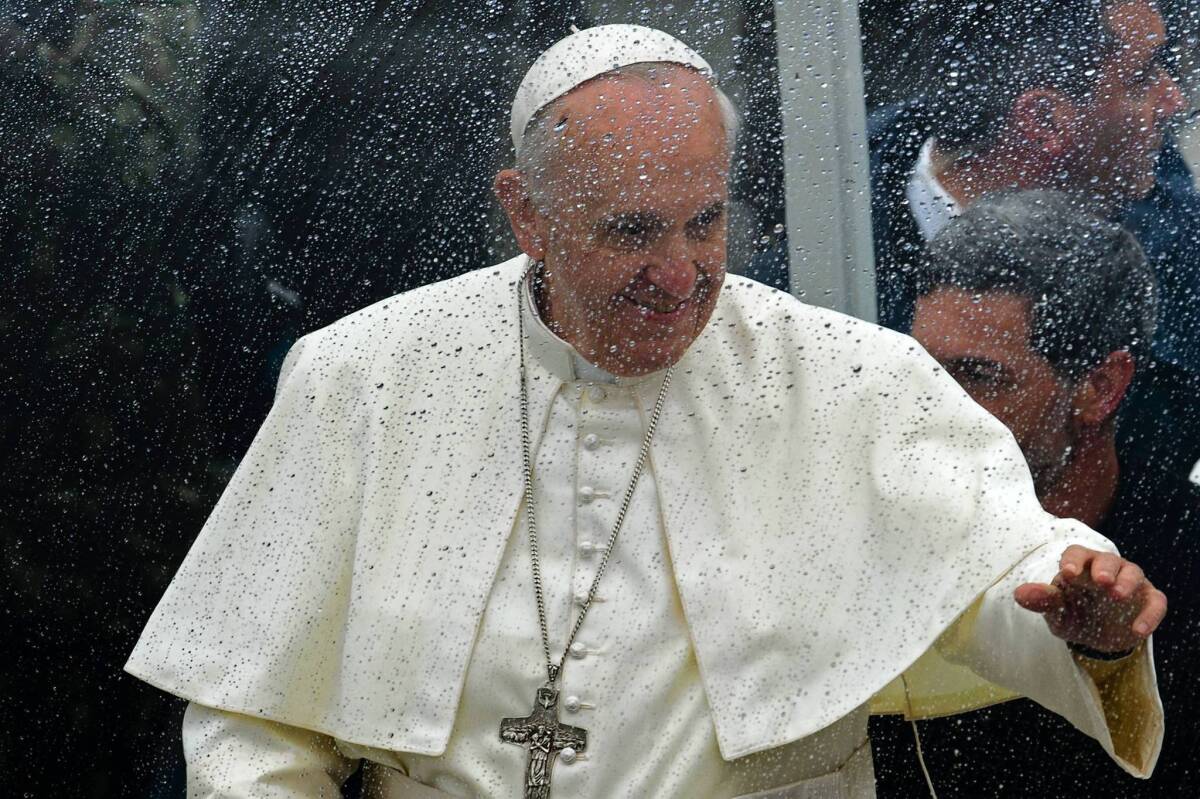At a Rio <i>favela</i>, Pope Francis’ upcoming visit brings side benefitsResidents of the slum in Rio de Janeiro say infrastructure upgrades have preceded Pope Francis’ visit. But they complain of abuse by police who routed gangs.

- Share via
RIO DE JANEIRO — When Pope Francis’ first trip to his native Latin America takes him into a Rio de Janeiro slum on Thursday, he will be walking into an intersection of all the major social problems that have beset Brazil’s economic rise — and that exploded into huge protests across the country last month.
Almost a year after the tiny Varghina favela, or slum, was “pacified” — retaken from drug gangs by the government — residents complain of police abuse and say the authorities’ arrival has not been accompanied by basic improvements in public services such as healthcare, transportation and education.
“It’s nice the pope is coming. But what we really need is better schooling and hospitals,” said Katia Silene, 44. “My son is almost 10 years old and can’t even read. What kind of a school is that?”
“And around here, you will see a doctor only if you have money,” said Silene, who lives a few blocks from the church the Argentine-born pontiff will be visiting. “Without money, you’re dead.”
Varghina is part of the rambling Manguinhos complex, which is in the northern tier of Rio de Janeiro and home to an estimated 36,000 people.
Silene says she went to see Pope John Paul II when he visited Brazil in 1980. She would like to see the new pope, but doubts she’ll be able to. Instead, the poor mother of five says she picked up some cleaning work around the event to make some extra cash.
Pope Francis has made care for the poor a central part of his message and has won the hearts of many Brazilians with his humility and common-touch warmth.
When President Dilma Rousseff received him Monday night, she praised the pontiff as an ally in the fight against inequality. She also hailed the protesters who have been regularly taking to the streets, saying they were proof the country’s young people wanted more.
But the demonstrations, which were triggered by increases in bus fares but expanded to include more than 1 million people nationwide after a heavy police crackdown, have led to a sharp decline in Rousseff’s popularity. Moreover, they exposed deep problems in what is still one of the most unequal countries despite substantial economic improvements in the last decade.
After the pope and Rousseff spoke, at least eight people were wounded and nine arrested outside the government palace in clashes between police and protesters. The demonstrators denounced not only police violence against residents of the favelas but also Rio Gov. Sergio Cabral, who oversees the “pacification” program.
“The government has been here almost a year and their first public program was only yesterday, and look what they did,” Miria Lopes de Oliveira, 41, a part-time maid in the Manguinhos complex, said Sunday, referring to a roving center to supply residents with ID cards and pointing to a big pile of trash that workers had deposited before they left the previous day.
In “pacified” favelas across Rio, some residents complain that the government arrived in the long-neglected communities only in the form of military police, who treat the residents with suspicion, if not outright disdain. Some even go as far as to say they preferred life under the drug gangs that used to run things.
“I watched them throw my nephew against the wall, kick his bare ankles and pepper-spray his face, just because he was out at the wrong time,” said Lopes de Oliveira. “Of course, I didn’t like the [drug-dealing] gangsters here, but no one ever treated us like that before.”
She allowed that “pacification” was a necessary step toward normal life and hoped things would improve someday.
At the closest health center, patients complain of hours-long waits that sometimes lead to their being turned away without seeing a doctor or nurse. Reile Nacif, 57, said she had dengue fever but did not manage to get care because of a lack of doctors. As she spoke Sunday, four days before the pope’s arrival, a police officer sprinted down the street pointing his gun at a boy who looked younger than 10, ordering him to stop. The boy got away.
In addition to attention, Pope Francis’ visit seems to have brought at least some material benefits to the slum. In the last two weeks, the government paved a main road and replaced the electrical system along the street that he will walk on Thursday. Less than 24 hours before his arrival, workers were still upgrading the electrical grid at the tiny Jeronimo Emiliani chapel he will visit, as others assembled a stage on the nearby soccer field, in front of graffiti with the name of the gang that ran things until recently.
“No one of any importance whatsoever has ever come to our community before, and definitely not anyone from another country,” said Jose da Costa Oliveira, a 67-year-old carpenter who volunteers at the chapel. “And now we have the pope. Hopefully that’s a good sign.”
Bevins is a special correspondent.
More to Read
Sign up for Essential California
The most important California stories and recommendations in your inbox every morning.
You may occasionally receive promotional content from the Los Angeles Times.










